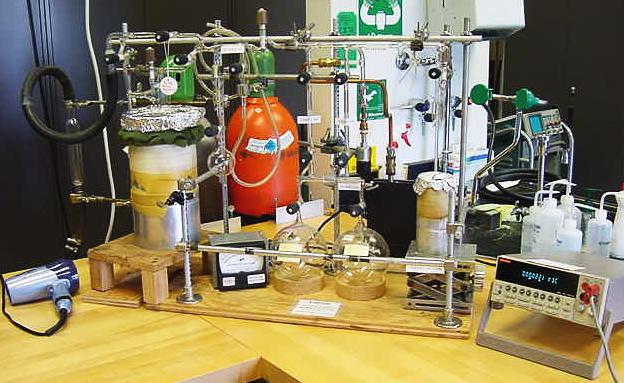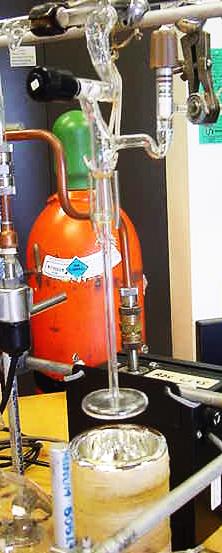Physical adsorption of gases


In this experiment students record an adsorption isotherm of N2 molecules and a second one for Ar atoms on a graphite substrate at a temperature of 77.4K. A characteristic monolayer feature of the N2 isotherm corresponding to a known density of molecules on the graphite substrate allows one to calculate the total substrate area, thus allowing for determination of the Ar-Ar spacing at monolayer completion for this adsorbate. To no surprise, this number is very close to the nearest neighbor spacing in solid argon. This follows from the fact that the main force governing adsorption and adsorbate-adsorbate interaction is the dipole-dipole force, the same force governing the vapor-liquid condensation and solidification of neutral atoms.
Experiment Information
Discussion Questions
- How (if at all) would an error in the calibration of the pressure gauge affect your results? A calibration error could be one (or both) of two types: (1) an offset error, in which zero volts is not really zero pressure; (2) a scaling error, in which a change in pressure is not correctly represented by the change in voltage (e.g, 10.0 torr reads 0.100 volts, but 20.0 torr reads 0.210 volts).
- How would too low a level of liquid nitrogen in the little dewar surrounding the cell affect your results?
- How would a wrong value for the sample volume affect your results? In particular, would it change the calculated ratio of the argon to nitrogen monolayer coverage? Explain why or why not.
- Imagine doing this experiment with krypton gas. First, would it work, that is, would you get a monolayer adsorbed at 77.4 K? Second, about what volume STP would make a monolayer coverage, based upon what you know about argon and nitrogen? Third, do you think that you might see a registered phase with Kr? Why or why not?
Background Information
- Dash, J. G, "Between two and three dimensions", Physics Today, December 1985, p. 26-32.
- Bienfait, M., J. G. Dash and J. Stoltenberg, "Growth of He-4 films on graphite, krypton-plated graphite, magnesium oxide and Mylar substrates", Phys. Rev. B, 21, 2765-2774 (1980).
- Chan, M. H. W., A. D. Migone, K. D. Miner, and Z. R. Li, "Thermodynamic study of phase transitions of monolayer N2 on graphite", Phys. Rev. B, 30, 2681-2694 (1984).
- Kjems, J. K., L. Passell, H. Taub, and J. G. Dash, "Neutron scattering from nitrogen adsorbed on basal-plane-oriented graphite", Phys. Rev. Lett., 32, 724-727 (1974).
- Kjems, J. K., L. Passell, H. Taub, J. G. Dash, and A. D. Novaco, "Neutron scattering study of nitrogen adsorbed on basal-plane-oriented graphite", Phys. Rev. B, 13, 1446-1462 (1976).